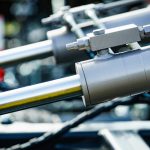How to Reduce Noise in Hydraulic Systems

1. Proper Fluid Selection:
The choice of hydraulic fluid can significantly impact the noise levels in a hydraulic system. Some fluids, such as those with a high viscosity, tend to create more turbulence and generate more noise. It is crucial to select hydraulic fluids that are specifically designed for low noise operation. These fluids are formulated to minimize air entrainment and reduce the formation of fluid cavitation, thus leading to quieter system performance.
2. Enhance System Filtration:
Adequate filtration is essential for maintaining the cleanliness of the hydraulic fluid. Contaminants in the fluid can cause increased friction and generate noise as they pass through valves and other system components. By implementing efficient filtration techniques, such as using high-quality filters and regularly replacing them, you can minimize the presence of contaminants and reduce noise levels.
3. Proper System Design:
Proper system design plays a crucial role in reducing noise levels. Pay attention to the layout and positioning of hydraulic components, as an improper design can lead to noise amplification. Ensure that pipes and hoses are properly supported and fastened to minimize vibrations that can contribute to noise. Additionally, consider using noise-absorbing materials or insulation around the hydraulic system components to dampen sound transmission.
4. Optimize Pump and Motor Selection:
The selection of pumps and motors can have a significant impact on noise levels. Look for hydraulic pumps and motors that are specifically designed for low noise operation. These components may incorporate advanced design features, such as improved internal damping or vibration reduction mechanisms, which help in reducing noise. Consulting with hydraulic experts can assist you in choosing the right pump and motor combination for your system that prioritizes quiet operation.
5. Address Cavitation Issues:
Cavitation occurs when the pressure in a hydraulic system drops below the vapor pressure of the hydraulic fluid, causing the formation and collapse of vapor bubbles. This phenomenon can generate noise and potentially cause damage to system components. To address cavitation issues, ensure that the fluid supply is sufficient and that the system pressure remains within safe operating limits. Implementing effective pressure relief mechanisms can help prevent cavitation and reduce noise levels.
6. Damping Techniques:
To further reduce noise in hydraulic systems, consider incorporating damping techniques. Damping involves the use of materials or devices that absorb or dissipate vibrations, reducing noise levels. Examples of damping techniques include the use of rubber or elastomeric mounts for hydraulic components, the application of damping materials on surfaces prone to vibration, and the installation of vibration isolators between the hydraulic system and its surrounding structure.
7. Regular Maintenance and Inspection:
Regular maintenance and inspection are essential for identifying and addressing potential sources of noise in hydraulic systems. Inspect hoses, valves, pumps, and other components for signs of wear or damage, which can contribute to increased noise levels. Additionally, regular fluid analysis helps in monitoring the condition of the hydraulic fluid, allowing for timely corrective actions to be taken to prevent noise-related issues.
Summary:
Reducing noise levels in hydraulic systems not only improves comfort but also contributes to the efficient and reliable operation of the equipment. Implementing proper fluid selection, enhancing system filtration, optimizing pump and motor selection, addressing cavitation issues, incorporating damping techniques, and conducting regular maintenance and inspections are effective methods to minimize noise in hydraulic systems. By following these techniques and consulting with hydraulic experts, you can create a quieter and more efficient hydraulic system that meets the desired performance levels while ensuring a comfortable working environment.
Need Hose & Fittings Specialists in San Jose, CA?
Welcome Royal Brass Incorporated! We are your 3rd generation, family-owned, local hose supplier! Our family has dedicated our services to supplying northern California with all types of hoses, fittings, flanges, regulators, valves, adapters, and gauges. We pride ourselves on having the most extensive inventory in northern California. Our inventory ensures that we can fix most products on site, the same day. Here at Royal Brass Incorporated, we only hire qualified individuals who are trained in factory sales. Our fully stocked warehouses ensure that we can fill your hydraulic and pneumatic hose, tubing, and fitting needs on time, every time. High-quality customer service is our goal and has been since 1952. Contact us today!
Categorised in: Hydraulic Systems





